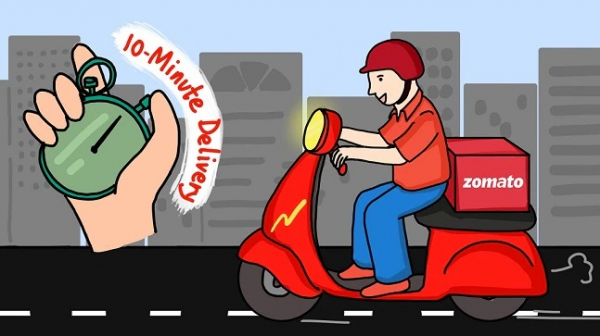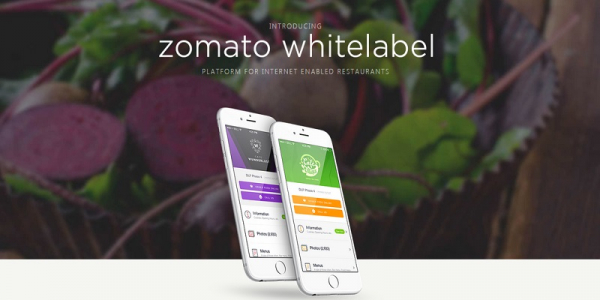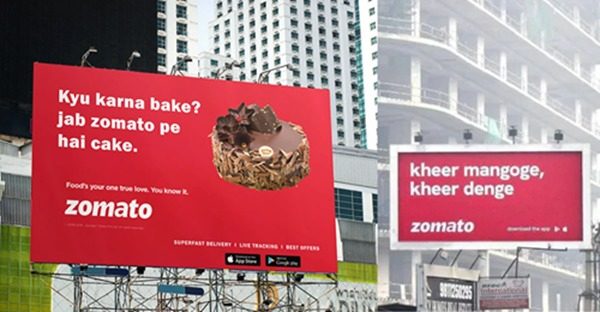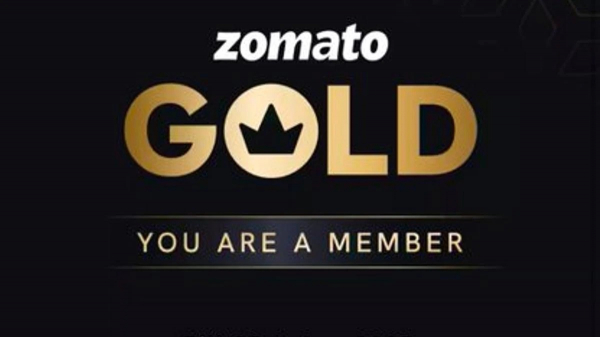Unpacking Zomato Business Model: How It Revolutionized Food Delivery
- by B2B Desk 2024-07-02 09:04:18
Zomato is a company based in India that offers services for finding and exploring restaurants, as well as ordering food online. Deepinder Goyal and Pankaj Chaddah established the food tech unicorn in 2008. Zomato has gained widespread recognition in the country and has successfully expanded into various foreign markets. It is currently functioning in 10,000 cities across 24 nations, such as the USA, India, Australia, Brazil, New Zealand, Singapore, the United States, and Qatar in the Middle East.
Currently, Zomato's main focus is on services such as online food ordering, restaurant reservations, loyalty programs, consultant services, and many other offerings. Zomato functions similarly to Google's search engine but focuses on food and dining locations. The company has expanded from a small home endeavor to become one of the biggest food aggregators globally. Zomato not just links individuals to food in all situations, but also collaborates with dining establishments to support a sustainable environment.
Thanks to its distinctive and environmentally friendly Zomato business model, along with a clearly outlined corporate framework, Zomato has succeeded in maintaining its position as a leading competitor in the industry. Zomato's success has been attributed to its affordability, convenience, and variety of options, which have earned people's trust over years of operation. Zomato persists in developing creative methods to cater to its customers.
Zomato - Value Proposition
Zomato is known for its efficient handling of refunds, offering exclusive discount vouchers, and addressing customer concerns promptly. Their support team is available 24/7 and is highly responsive. They provide multiple payment options, including digital wallets, debit/credit cards, and net banking. Recently, they've partnered with pay-later services like GetSimpl and LazyPay, allowing customers the flexibility to dine now and pay later, a key aspect of the Zomato Business Model.
During the lockdown, Zomato's delivery team implemented rigorous safety measures to ensure the safety of customers while fulfilling online orders. They went beyond food delivery to assist in delivering groceries and essential medicines in areas facing shortages.
Zomato quickly adapted to the challenges of the pandemic by introducing a priority delivery feature. Their agility during this time has been impressive. Currently, Zomato competes strongly with Swiggy, serving millions of customers across India. The Zomato app is free to download and available on both Android and iOS platforms.
Zomato - Revenue Model
Zomato makes a lot of money without selling anything to customers.
From the beginning of FY21, there has been a rise in revenue from Zomato's food delivery segment. The Gross Order Value (GOV) increased by 19% quarter over quarter in the first half of FY22 and by 158% year over year to INR 54.1 billion or $721 million
The company is split into two divisions: one for delivery services, and the other for advertising. In addition to online ordering, a revenue stream for Zomato comes from several other sources that customers are familiar with. Listed below are the sources that generate revenue for it:
Live events

The company is embarking on a new business venture with live events. It arranges and conducts activities like food fairs and culinary classes. These occasions provide a great opportunity for Zomato to interact with its customers and market its brand, a key aspect of the Zomato Business Model.
Zomaland, one of the largest food festivals in India, offers an opportunity to discover fresh and thrilling culinary experiences, enjoy entertainment, and appreciate amazing artwork. To attend this event, you must make a payment via the Zomato app or PayTm Insider.
In total, a significant portion of 72% of overall revenue is generated from advertising and marketing for restaurants. Moreover, ticket sales account for 12% of the revenue, while advertising makes up 4%. 3% of the revenue is generated from consulting services, while another 2% comes from food delivery services. Finally, approximately 7% of the total revenue comes from Zomato Gold and other analytic services.
Food Delivery

Currently, Zomato is recognized as a food delivery app that operates on a demand basis. Zomato serves as a medium that links restaurants with customers, a fundamental aspect of the Zomato Business Model. Additionally, it aids customers in receiving their food delivered to their doorstep. Most people believe that Zomato operates in this manner.
Zomato takes a commission from restaurants for orders, which is split between the delivery partner and the company. Conversely, the rate of commission is based on the completion of deliveries. If Zomato handles the delivery, the commission rate would increase. On the flip side, when restaurants handle food deliveries, the commission rate tends to be lower.
Zomato Kitchens

Zomato partners with entrepreneurs to establish and operate Zomato Kitchens, providing kitchen infrastructure services to selected restaurant operators under various brands. This initiative helps entrepreneurs set up restaurants in optimal locations with an investment starting from INR 35 lakh. Currently, Zomato manages over 180 affiliate kitchens and promises investors monthly returns ranging from INR 2 lakh to INR 4 lakh.
As Zomato expands, it's moving away from cash-intensive models and streamlining activation and other revenue streams generated by users. Initially focused on user retention to compete with rivals like Swiggy, Zomato has historically relied on aggressive discounting. However, the company aims to diversify its revenue sources and generate profits through other aspects of Zomato business model.
White Label Access

Zomato also offers Zomato Whitelabel, allowing restaurants to create a personalized food delivery app, a part of the Zomato Business Model. It also
provides consultancy services for cloud kitchens and restaurants. Zomato collaborates with specific restaurant owners to assist in finding new locations for growth at a low set price, while offering users more choices. It gives the necessary licenses and operational support for these restaurant partners.
Advertising and Promotions

Zomato provides restaurants with a range of advertising and promotional services to boost their presence on the platform. Eateries pay to showcase their listings prominently, conduct specific ad campaigns, and provide special promotions to draw in customers. The ad services make up a large part of Zomato's income.
Zomato Gold Subscription Model

Zomato Gold is a membership program, integral to the Zomato Business Model, that provides special offers, savings, and free items at partner restaurants for subscribers. Customers pay a recurring fee to enjoy these advantages, with restaurants gaining from boosted foot traffic and customer loyalty.
Zomato’s Key Partners
Zomato collaborates closely with several key partners as part of its business model:
Local Restaurants: Zomato collaborates with dining establishments to boost their online presence, attracting a larger customer base and facilitating access to new markets.
Users: Zomato provides a convenient platform for users to discover, explore, and order from various restaurants, making dining out or ordering in hassle-free.
Delivery Partners: Zomato partners with delivery providers who ensure seamless doorstep delivery services for its customers, offering both full-time and part-time delivery options.
Reviewers: Reviewers play a crucial role by sharing their experiences and insights about restaurants, cafes, and eateries, helping other users make informed decisions.
In addition to these core partnerships, Zomato has also established collaborations with major businesses like Uber, Visa, and PayPal. For instance, its integration with Uber allows customers to book rides directly to their chosen restaurants, streamlining the process and offering a seamless experience without switching between apps.
Zomato's strategic alliances extend beyond operational partnerships to include support in various areas such as market research, legal and regulatory compliance, and other business procedures. This collaborative approach has contributed to Zomato's growth and its evolution into a globally recognized platform, simplifying the way people enjoy their favorite foods with just a few taps on their devices.
Final words
Zomato's impressive business model success has motivated numerous entrepreneurs to explore similar ventures in the food delivery industry. Our Zomato clone offers a comprehensive solution aimed at maximizing your ROI, contributing to the growing trend of new entrants in this sector.
FAQs
Q. What kind of business model is Zomato?
A. Zomato Business Model generates revenue through multiple channels, including advertising, online ordering and delivery, and premium subscription services. Zomato has become a leading player in the online food industry by providing services to users and restaurants.
Q. Is Zomato B2B or B2C?
A. Zomato also had an early-mover advantage for its B2B business as it entered the B2B segment by buying Hyperpure in the middle of 2018, much before its acquisition of Blinkit in mid-2022. By the end of that year, Zomato was already servicing more than 30,000 B2B customers in the Horeca segment.
Q. How does Zomato earn money?
A. However, Zomato's quick-commerce arm, Blinkit, continued to be a pain point, with revenue up only 6% QoQ. Zomato makes money from its food delivery business by charging restaurants a commission on each order. The company also earns revenue from advertising on its platform.
Q. Is Zomato profitable or not?
A. For the full 2023-24 financial year, Zomato posted a profit of Rs 351 crore as compared with a loss of Rs 971 crore in the year before.
Also Read: Top 10 ai stocks in india to invest in 2024 - 25
POPULAR POSTS
Pine Labs IPO 2025: Listing Date, Grey Market Premium, and Expert Outlook
by Shan, 2025-11-05 09:57:07
India’s Largest Unicorn Startups in 2025: Rankings, Valuations, and Trends
by Shan, 2025-09-18 10:32:48
Swiggy Launches Toing App in Pune to Serve Affordable Food Delivery — What It Means for the Market
by Shan, 2025-09-16 12:29:08
Trending Startup Ideas for 2025: Where Innovation Meets Opportunity
by Shan, 2025-09-05 11:56:43
19 Best Business Ideas to Start in India 2025: From Low Investment to High Demand
by Shan, 2025-09-03 10:58:15
Razorpay Business Model Explained: How the Fintech Giant Makes Money in India
by Shan, 2025-08-05 12:10:28
How CRED Reimagined Credit Card Rewards into a Billion-Dollar Fintech Empire
by Shan, 2025-08-04 12:28:03
RECENTLY PUBLISHED

Loan EMIs to Drop as RBI Slashes Repo Rate - Full MPC December 2025 Highlights
- by Shan, 2025-12-05 11:49:44

The Agentic Revolution: Why Salesforce Is Betting Its Future on AI Agents
- by Shan, 2025-11-05 10:29:23

Top 10 Insurance Companies in India 2026: Life, Health, and General Insurance Leaders Explained
- by Shan, 2025-10-30 10:06:42

OpenAI Offers ChatGPT Go Free in India: What’s Behind This Big AI Giveaway?
- by Shan, 2025-10-28 12:19:11

Best Silver Investment Platforms for 2025: From CFDs to Digital Vaults Explained
- by Shan, 2025-10-23 12:22:46





 Subscribe now
Subscribe now 